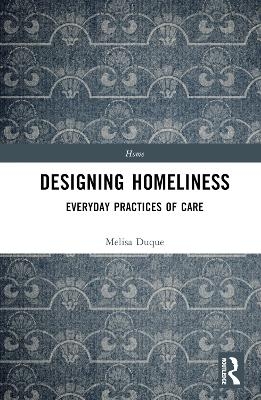
Designing Homeliness
Everyday Practices of Care
Seiten
2024
Routledge (Verlag)
978-1-032-13638-7 (ISBN)
Routledge (Verlag)
978-1-032-13638-7 (ISBN)
Designing homeliness: everyday practices of care proposes an interdisciplinary lens to investigate home.
Designing Homeliness: Everyday Practices of Care proposes an interdisciplinary lens to investigate home. The book situates homeliness as a continual process of creating, maintaining, and restoring meanings and experiences of home. Melisa Duque draws from her design ethnographic practice with people using smart home lighting, gardening, jigsaw puzzles, and op-shopping to present everyday examples in dialogue with theoretical discussions, revealing the role of homeliness in generating wellbeing. The research projects featured in this book were conducted in rural, regional, remote, and metropolitan areas in Australia, at familiar and unfamiliar living sites, including people’s homes, a mental health hospital unit, a residential aged care facility, and a charity shop revaluing domestic things. This book offers conceptualisations and practical tools to advance home studies while engaging with broader discussions on ageing, wellbeing, and sustainability. Led by design research and social science analysis, this book will be of value for students, researchers, and practitioners at these intersections, including design, anthropology, and human geography.
Designing Homeliness: Everyday Practices of Care proposes an interdisciplinary lens to investigate home. The book situates homeliness as a continual process of creating, maintaining, and restoring meanings and experiences of home. Melisa Duque draws from her design ethnographic practice with people using smart home lighting, gardening, jigsaw puzzles, and op-shopping to present everyday examples in dialogue with theoretical discussions, revealing the role of homeliness in generating wellbeing. The research projects featured in this book were conducted in rural, regional, remote, and metropolitan areas in Australia, at familiar and unfamiliar living sites, including people’s homes, a mental health hospital unit, a residential aged care facility, and a charity shop revaluing domestic things. This book offers conceptualisations and practical tools to advance home studies while engaging with broader discussions on ageing, wellbeing, and sustainability. Led by design research and social science analysis, this book will be of value for students, researchers, and practitioners at these intersections, including design, anthropology, and human geography.
Melisa Duque is a design researcher at Monash University and the University of Auckland. Her works sits at the intersection of Design Anthropology, Participatory Design, and Everyday Design. Melisa’s research looks at two main areas: designing for revaluing, including practices of repair and reuse, and design for intergenerational and ageing wellbeing.
1 Introduction: situating homeliness
2 Homeliness, wellbeing, revaluing and everyday designing
3 The lit home: smart lights and lighting for homeliness
4 Grounding activities: gardening and puzzles for wellbeing
5 Relational patina: care and value negotiations
6 Inconclusion: co-living with shadows, grief and decay
| Erscheinungsdatum | 22.08.2024 |
|---|---|
| Reihe/Serie | Home |
| Zusatzinfo | 44 Halftones, black and white; 44 Illustrations, black and white |
| Verlagsort | London |
| Sprache | englisch |
| Maße | 156 x 234 mm |
| Gewicht | 453 g |
| Themenwelt | Kunst / Musik / Theater ► Design / Innenarchitektur / Mode |
| Naturwissenschaften ► Biologie ► Ökologie / Naturschutz | |
| Sozialwissenschaften ► Ethnologie | |
| Sozialwissenschaften ► Soziologie | |
| ISBN-10 | 1-032-13638-3 / 1032136383 |
| ISBN-13 | 978-1-032-13638-7 / 9781032136387 |
| Zustand | Neuware |
| Informationen gemäß Produktsicherheitsverordnung (GPSR) | |
| Haben Sie eine Frage zum Produkt? |
Mehr entdecken
aus dem Bereich
aus dem Bereich
Grundlagen, Systeme, Anwendung, Wirtschaft
Buch | Hardcover (2024)
Carl Hanser (Verlag)
99,99 €


